10 Common Catholic Stereotypes, Myths, and Misconceptions
There are lots of wrong ideas about the Catholic Church out there. Are you guilty of believing any of these 10 very common Catholic stereotypes, myths, or misconceptions?
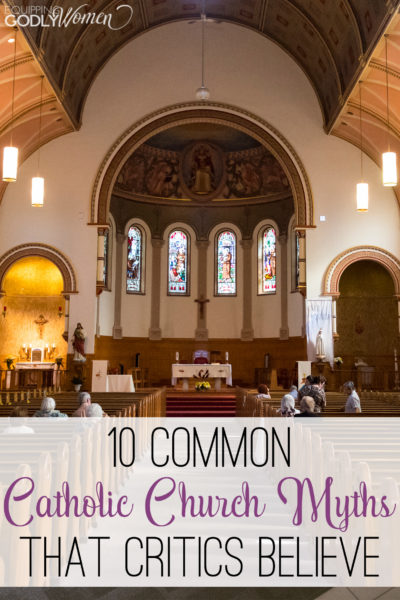
Two years ago, I read a book that would change my perspective on Christianity forever: Surprised by Truth* by Patrick Madrid.
While it (and all of the research I did afterward) wasn’t enough to fully convert me to Catholicism, it did poke some pretty big holes in everything I was taught growing up as a Protestant, and it exposed lots of stereotypes about Catholics that I’d heard.
Things I was so sure of before — basic tenets of my faith — were suddenly glaringly wrong.
It was a pretty tumultuous time, as I reevaluated everything I’d believed my whole life. It was the start of something big, and it was the start of the series you’re reading now.
(You can read the whole series here, if you’re interested.)
Now, two years later, I’m still not fully convinced that Catholic Christianity has it all right. But I’m not convinced they don’t either.
What I do know is that much of what people believe about Catholics and the Catholic church simply isn’t true. Lots of what people “know” aren’t facts — they are Catholic stereotypes that don’t hold up when we dig just a big deeper.
And today, I’d like to set the record straight.
Are you guilty of believing any of these Catholic stereotypes and myths?
*This post contains affiliate links. Please see my full disclosure statement for additional information.
—————————-
A Few Things to Keep in Mind Before We Begin…
1. This post is about official Catholic belief — not what Catholics do in the privacy of their own homes.
What a religion officially teaches and how the people put it into practice are two entirely different things. In this post, I want to replace Catholic stereotypes with accurate information. This post is only meant to talk about what Catholicism actually officially teaches — not what people actually do in the privacy of their own homes or in their local churches.
(There will always be individual people messing things up in every religion)
2. This post is just an introduction to Catholic stereotypes, myths, and misconceptions.
This post is not meant to be an exhaustive guide to everything the Catholic Church teaches and misconceptions about it. That’d be waaaaay too long for a single blog post! It’s simply an overview of 10 of the most common stereotypes about Catholics and their beliefs.
Please see the links below each point to read about each issue more in depth. There are some really great posts in the rest of this series, and they explain these Catholic myths in ways a simple paragraph or two cannot adequately cover.
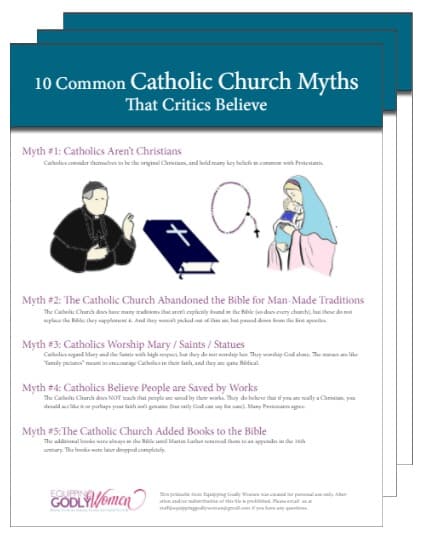
Want to Explore Catholic Stereotypes in More Depth?
I have a free guide that will help you do just that!
“10 Common Catholic Church Myths that Critics Believe” contains all the Catholic stereotypes from this article so you can print them out, refer back to them, and share them with others.
Plus – it even includes 5 bonus myths not included in this article!
If you are looking for information to help you share with non-Catholic family members OR if you’re thinking about becoming Catholic but you still have some questions about Catholic misconceptions — this is a fantastic resource to have on hand.
—————————-
Alright, let’s dive in!
10 Common Catholic Stereotypes, Myths, and Misconceptions
Myth #1: Catholics Aren’t Christians
Actually, Catholics consider themselves to be the original Christians, who are doing their best to hold to the same beliefs and traditions that the church held to in the first century.
According to Catholics, Catholics and Protestants are all Christians, and both Catholics and Protestants can go to Heaven. The Protestant denominations are simply off-shoots of Catholicism (or of other denominations) that branched off over various disagreements about what the Catholic Church was teaching.
Whether Catholics have held fast to the right teachings throughout the ages or whether they veered off and the Protestant denominations got us back on track — that’s something I’m still trying to discover.
This is a big Catholic myth to kick off this post: Even though Catholic stereotype #1 says that Catholics aren’t Christians, the truth is that Catholics are doing their best to follow the teachings of Jesus Christ (and isn’t that one of the things that makes a Christian a Christian?).
Myth #2: The Catholic Church Abandoned the Bible for Man-Made Traditions
While the Catholic Church does have many traditions that aren’t explicitly found in the Bible, so does every church (and so do you, in your home). Traditions themselves aren’t bad. It’s only when we prioritize them over God himself or when they take us farther away from God instead of drawing us near that they cause problems.
One reason that the Catholic Church has so many traditions is that the first century apostles didn’t write down absolutely every single thing they taught. In fact, John 21:25 tells us,
“Jesus did many other things as well. If every one of them were written down, I suppose that even the whole world would not have room for the books that would be written.”
Catholics do their best to value and uphold both the written and oral teachings that were passed down from the apostles. Protestants look to the written teachings (the Bible) only.
The Catholic Church still highly prioritizes Scripture. It just isn’t their only source of information (and nowhere in the Scriptures does it tell us it should be).
Catholic stereotype #2 tells us that Catholics abandoned the Bible, but the truth is that Catholics use the Bible along with written and oral traditions.
For more on this topic, I’d highly recommend my post Who Has the Ultimate Authority? A Biblical Look at Sola Scriptura. You can also find the explanations for many common Catholic traditions in Why Do Catholics…? Honest Answers to Your Burning Questions.
Myth #3: Catholics Worship Mary / Saints / Statues
It’s easy to see how some Catholic stereotypes (like this one) got started, but again, it really is just another of many misconceptions about the Catholic Church.
Catholics do not worship Mary or statues; they worship God alone.
Instead, they “venerate” Mary, which, according to Google, is just a fancy word for “regard with great respect.” Similar to how we would show great honor or respect to a King or Queen, without actually worshiping them, Catholics hold Mary and other saints in high esteem as good examples of how to live a faithful life.
Yes, to Protestants, the practices definitely look like worship, and it’s easy to understand why this Catholic myth is still around. But since worship is an attitude of the heart, I don’t think you can “accidentally” worship someone and not know it. If Catholics’ hearts are in the right place — and they only want to show honor — then it’s not worship.
And it’s the same with statues as well. Catholics don’t worship statues. Instead, they are used as decorations to help Catholics remember people who have gone before, similar to how you might put pictures of your friends and family on your wall, or even a baseball card collection you may have had as a kid.
You look at them, you remember them, but you certainly don’t worship them.
They’re just decorations or teaching instruments meant to inspire faith.
Sure, Catholics might have statues and talk about saints who lived a long time ago. But contrary to Catholic stereotype #3, the truth is that Catholics honor Mary and other examples of faith (even with statues!) while saving their worship for God alone.
*For more information on this, don’t miss my post Do Catholics Worship Mary, Saints or Statues?
Myth #4: Catholics Believe People are Saved by Works
The Catholic Church does NOT teach that people are saved by their works. In fact, the catechism of the Catholic Church actually specifically forbids this notion.
Rather, the Catholic Churches basically teaches that, “If you call yourself a Christian, but you don’t act like it, maybe you’re not really a Christian after all.” Or, “Yes, God saves you through faith, but it’s a living faith that naturally produces good works.”
This Catholic teaching is actually 100% Biblical (here are plenty of Bible verses that support it), and is even taught by some highly respected Protestant/non-denominational pastors, including the most Godly man I’ve ever heard speak, Francis Chan.
This widespread Catholic stereotype #4 says that Catholics believe they can get to Heaven by earning it through good works. The truth is that Catholics see good works as the Spirit-inspired fruit of a heart saved by God’s grace alone.
*For a more in-depth look at this topic, please see my other posts Is Faith Alone Enough? and Are You a Christian? Are you Sure?
Myth #5: The Catholic Church Added Books to the Bible
The books that are currently in the Catholic Bible are the same books that the church has recognized as being in the Bible for centuries. It wasn’t until the 16th century that Martin Luther and the Reformers moved them to the appendix, before they were ultimately taken out.
(For the record, Martin Luther wanted to remove James, Hebrew, Jude and Revelations as well, but was unsuccessful. The books that he did remove are called Tobit, Judith, 1 and 2 Maccabees, Wisdom of Solomon, Sirach, and Baruch.)
Whether or not the additional books should have been left in or taken out — I don’t know. I wasn’t there. Guess you have to ask yourself if the early church could have been wrong for 1700 years and the Reformers knew better than the earlier Christians did.
Either way, I’ve read through all these additional books, and there really isn’t much surprising in them. They read like pretty typical Old Testament books. There are a few verses about praying for the dead, but other than that, I don’t recall reading anything that stuck out as especially “Catholic.”
This Catholic stereotype #5 is a doozy because the truth is actually the opposite — one man decided to take out some books that had been in the Bible for over a thousand years.
*For more information, don’t miss my post on Martin Luther, the history of the Catholic Church, and the Bible books issue.
Myth #6: Catholic Priests Can’t Be Married
(Some) Priests are married! Some even have children and grandchildren. (This happens when a man is already married and a priest in a different denomination and then converts to Catholicism later.)
And of those who become priests the usual way and aren’t allowed to get married–not all of them even want to be. Priests know what they’re signing up for. No one is making them be a priest. They have a choice between God and a wife, and it is their choice to make. No one is forcing them to choose one or the other.
Catholic stereotype #6 is in fact the general rule — but the bigger truth is that the path of some Catholic priests does allow them to marry a woman. And those who don’t often consider themselves to be married to the church, the Bride of Christ.
*For more information, read my post on priests, the Pope and confession.
Myth #7: Catholics Recrucify Jesus at Mass
I haven’t heard this Catholic misconception in real life, but apparently it’s popular. Catholics do not re-crucify Jesus at Mass.
Instead, they believe that Jesus and the crucifixion occur outside the limits of time (because God can do cool stuff like that), and so when they celebrate Mass, they are only making the sacrifice (which has already occurred) “present” on the altar.
While Catholic stereotype #7 imagines Catholics as recrucifying Jesus at Mass, the truth is that Catholics believe they are making the eternal reality present in our non-eternal timeline at Mass.
*For a very interesting and in-depth look at the Eucharist, be sure to check out my post Is the Eucharist Really Just a Symbol? 5 Convincing Proofs that Say that It’s Not.
Myth #8: Catholics Believe Only Catholics Can Go to Heaven
While Catholics do believe their religion is the one true religion and the ordinary (most common) means of bringing people to salvation, it is a common Catholic misconception that they believe this is the only way. Instead, they recognize that God can use any means He wants to to bring people to Himself, including those other than the Catholic church, especially if the person has never had the opportunity or knowledge to join the church.
They believe that Protestants who have no reason to suspect their beliefs are incorrect can go to Heaven, as well as Protestants who were planning to convert before death but hadn’t done so yet.
Furthermore, Catholics do not believe you can say with 100% certainty who will go to Heaven (though you can have a good idea) simply because God is judge and we are not — and who are we to presume to know His thoughts?
Even though Catholic stereotype #8 imagines Catholics as very close-minded about the salvation of others, the truth is that Catholic teaching leaves lots of room for God’s grace to work in every single person’s salvation.
Myth #9: Catholic Priests are Child Molesters
Yes, the Catholic church has had huge and horrible scandals in which some priests were molesting children. This was absolutely awful and shameful, and they will have to stand before Jesus for what they did. That part is not one of the myths about the Catholic Church.
But if you look at the statistics, only a very small minority of priests were involved, and it isn’t really fair to blame the entire Church or dismiss the Church’s core teachings for what a few did. Scandals like this happen in EVERY church and in every city. That doesn’t make everyone guilty of the crimes of a few, and it does NOT mean that innocent Catholic priests deserve negative treatment today because of this stereotype.
It is heartbreaking that Catholic stereotype #9 does have some truth to it — some Catholic priests have molested children. But the truth is that the vast number of priests are men who serve God humbly and who shepherd their flock instead of harming the sheep.
*For more information, be sure to check out my series post on priests, the pope and confession.
Myth #10: The Catholic Church is Anti-Women
The church isn’t anti-anyone. They do believe birth control is morally wrong — the same thing every denomination believed until 1930. But when pretty much every other denomination began to change its mind, the Catholic church held its ground on this teaching. They continue to teach the same thing today, even when this gets interpreted as an “anti-woman” Catholic misconception.
The Catholic church also doesn’t allow women to be priests, which has upset many. But if you look at their rate of women in non-priest leadership positions, it is WAY higher than average. The Catholic church may not do things the “feminist” way, but they do hold women in very high esteem, even referring to them as the “crown of creation.” That’s pretty special if you ask me 🙂
So while Catholic stereotype #10 paints the Catholic church as an “anti-woman” institution, the truth is that many women are in leadership positions in the Catholic church, and the Catholic church holds women in very high regard.
Like I said earlier, the intent of this post is ONLY to dispel a few stereotypes about Catholics so that, going forward, your thoughts and opinions aren’t swayed by misinformation. I’m not trying to convert or persuade, just to present you with some information about Protestant and Catholic beliefs so YOU can make an informed decision of your own. 🙂
Ready for more? You can read through the rest of the posts in this Catholic vs Protestant series here OR see what I ended up deciding in my latest Catholic update post here.
I’d love to hear your thoughts and opinions on these Catholic stereotypes and myths, or others you’ve heard! Leave me a note (or a book 🙂 ) in the comments section below!
—————————-

Ready for More?
Honestly, these 10 stereotypes are just the start. Download the print version to get a handy guide you can refer to later or share with others AND get 5 bonus Catholic myths that aren’t included in this article!

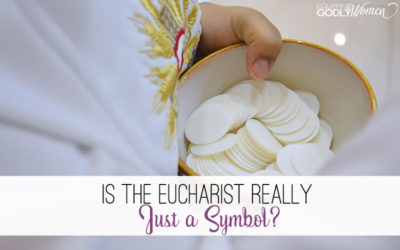
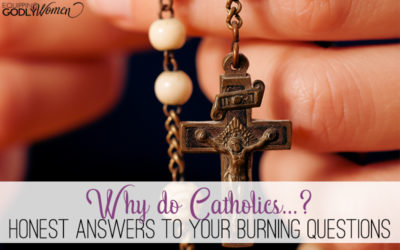
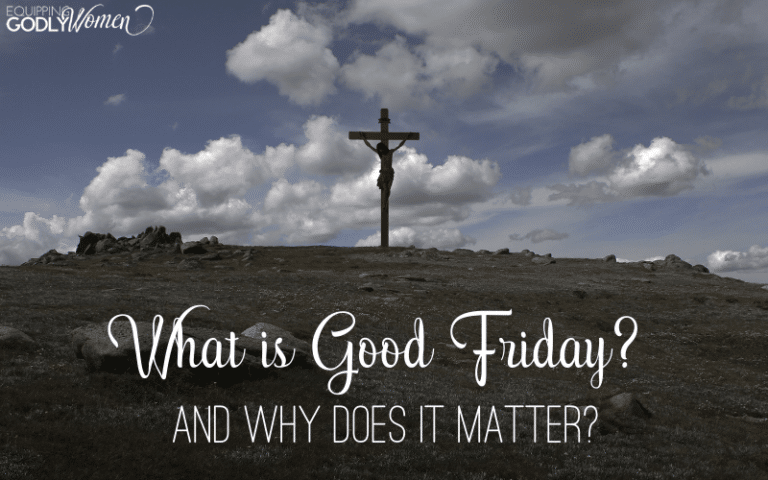

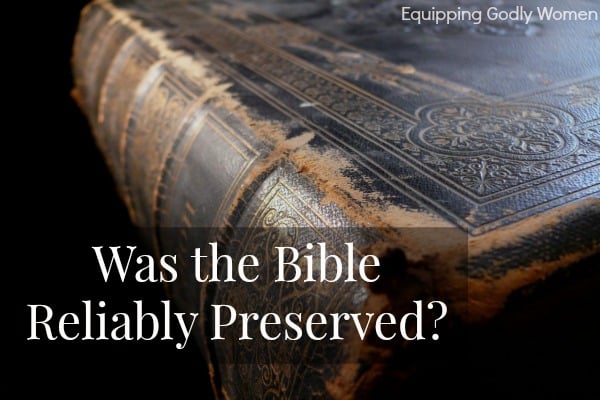

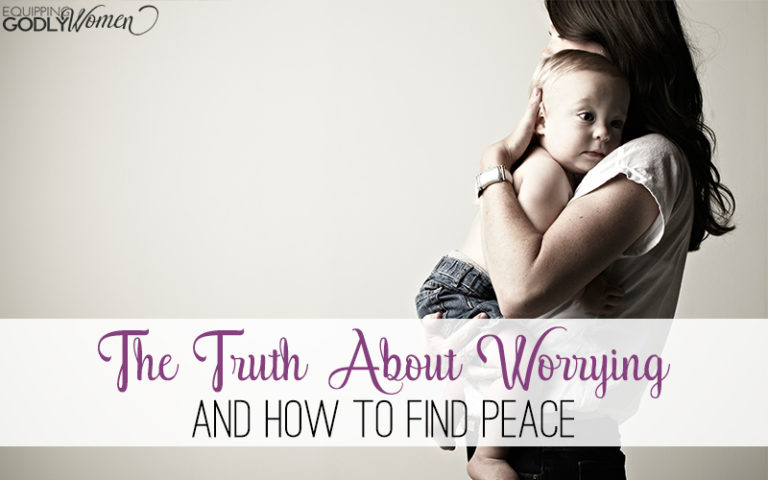
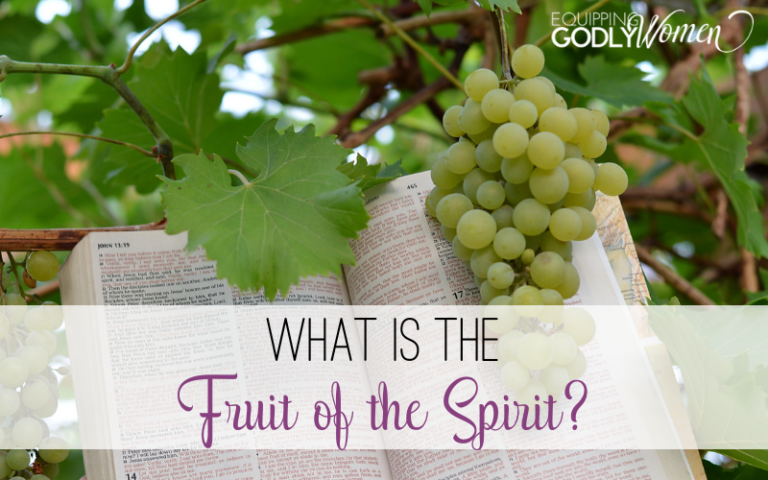
Thanks for the article. I am not Catholic but during a time of intense spiritual trials some aspects of Catholic prayer and worship kept me from fleeing God entirely. I also learned there are so many myths about them that simply are not true.
The good news is no matter how far you’ve wondered, it’s never too late to come back. You can start today!
I found it interesting that almost all of the comments were about Mary and none were about your Myth #9: Catholic Priests are Child Molesters. Of course not all priests have committed such evil, but I think you have minimalized the molestation’s impact. The greater evil was, and still is, the cover-up. Please refer to this attached article and its statistics: Note – this is only data for the US.
http://www.bishop-accountability.org/AtAGlance/USCCB_Yearly_Data_on_Accused_Priests.htm
Of most interest is the paragraph which states: “The USCCB has never released a count of the number of priests accused in 2003, which was a year when many victims came forward. They have now created another gap in the running-total data in January-June 2014, as explained below.”
Another article of interest was written last year: https://www.nytimes.com/2016/04/20/insider/sex-abuse-and-the-catholic-church-why-is-it-still-a-story.html
Please do not think this evil still does not exist and The Church’s hierarchy is not continuing to hide all the truths. You wrote about this myth as if it was in the past, but these evils do not just go away – just look at the statistics in the referenced article, and these are only what they choose to report.
I was raised Catholic and went to Catholic schools from the first grade though high school. I even sent my children to Catholic school for a few years. But around the same time as The Church’s scandal surfaced I (in my early 40’s) also found out that my father was a pedophile. He victimized his own sons (for years) and grandsons (7 children in all) and who knows the countless others. I have not stepped foot in Church but a few times since – I no longer feel safe. After many years of reflection I believe the institution of the Catholic Church is corrupt, but the basic lessons I learned to live by are what mattered – and those were from God and through Jesus’s teachings. One day I will return.
For my son’s and brothers, for all those other children harmed by this evil, and for your children, please do not think this evil is in the past. One of the things I learned from my catholic schooling was: “The Devil is Clever; The Devil is Patient.” The devil worked through my father and he worked his way into the Church. The Devil never tires.
I pray for wisdom and strength. And as for Mary – I prayed to her also. It really doesn’t matter – it all seems to help.
I am glad I found your post by happenstance.
I am so, so sorry to hear that 🙁 And you’re definitely right that there is still too much of that going on — but that’s in ALL churches and schools and other organizations — not just the Catholic Church. I don’t want to discriminate against the many, many truly good Catholic priests out there and the whole belief system as a whole over the sins of those who got it wrong.
PLEASE check out Mike Gendron , Rib Zins, John MacArthur , Richard Bennett on YouTube! By Gods love and pure grace , he rescued me from that false religion I was in for 54 yrs! And I know the doctrines of the RCC very well!! You need to understand that theology better ! A soul is a terrible thing to waste! Open your heart to Christ ! Thank you, Michelle.
Michelle,
Its amazing that because of free will and understanding,We choose to see differently,
Am a cradle catholic in my late thirties and yes know the good bad and ugly of the church,truly exposed to me from my birth,When i began questioning the doctrines suprisingly from non catholic sources and even political history,I came to a different conclusion,Moree rooted in My Faith as a catholic.So many other people from atheism,islam and even protestant christians have come to same conclusion so really the opinion of one person does not matter especially without tangible evidence.
Thanks
You keep referring to what Catholics practice at home versus what doctrine is and there you are making a fatal mistake. When one say’s “amen” prior to receiving the host they are accepting ALL of MOTHER Church’s teachings. Otherwise they are in mortal sin. Period. There are no exceptions. Those who think otherwise aren’t actually Catholics. So I pray you would think hard because in fact you are misrepresenting both Catholic and Protestant beliefs. That’s a huge burden when it is time to stand before Christ.
If you really want to know what Catholics believe quit reading pop Catholic books by Madrid and others. You need to burrow down into theology and make sure you are not listening to people who have half formed ideas about the Church.
Whether it’s mortal sin or not, the fact of the matter is many, many people DO behave differently than official church teachings. It’s just a fact of life. No one is perfect, and everyone falls short somewhere.
Also, whether or not *I* study Catholic theology, most non-Catholics never will. Instead, they will gain most everything they know about the Church and her teachings by watching what Catholics do. Whether that’s right or wrong – that’s how they are most likely to form their opinions.
My intention is only to say — Just because Catholic individuals behave one way does NOT mean that the church teaches that or supports that lifestyle. I want to encourage people to get to know what the church actually teaches – not just what they’ve seen by imperfect humans who get things wrong sometimes.
1Timothy 2:5 For God is one, and the mediator of God and men one, the man Christ Jesus….
2Timothy 3:16-17 Every scripture is divinely inspired, and profitable for teaching, for conviction, for correction, for instruction in righteousness; 17that the man of God may be complete, fully fitted to every good work.
John 3:7 “Do not be amazed that I said to you, ‘You must be born again.’
Catholicism nor Christianity cannot saves but only Jesus Christ is The Only Way To Heaven.
Human wisdom and interpretations of the bible doesn’t matter at all before God, The Holy Spirit alone have the right spiritual interpretation of the God’s inspired Word.
We must all be born-again meaning we need to repent to God & truly call upon The Name of Jesus & received Him from our hearts to be fully saved.
Two important questions we must all answer: Are you sure all your sins are forgiven? Where will your soul go in eternity when you die?
You shall know the Truth & The Truth will set you free.
Jesus Christ loves you and we love you
Deuteronomy 4:2 “You shall not add to the word which I am commanding you, nor take away from it, that you may keep the commandments of the LORD your God which I command you.
Revelations 22:18 I testify to everyone who hears the words of the prophecy of this book: if anyone adds to them, God will add to him the plagues which are written in this book;
Rev 22:19 and if anyone takes away from the words of the book of this prophecy, God will take away his part from the tree of life and from the holy city, which are written in this book.
All our faith, practices, traditions, life, work & ministry must be solely & wholly based on The Word of God, that’s the Only Authority of Jesus Christ.
You shall know the Truth & The Truth Shall Set you Free.
Why did we need Jesus to come and die on the cross to reconcile us to God?
because Adam & Eve failed their temptation and sinned causing a rift between God & man.
Genesis 3:8-24ampc
How does Jesus’ sacrifice on the cross accomplish this reconciliation? Because Jesus did NOT Sin during His 40 day temptation. That means he could have… which is a bold thought but if that is not true and He couldn’t sin, what was the point of the devil tempting Him? IT IS THE WHOLE POINT! Jesus Christ was God AND man who lived perfectly without sinning… an appropriate blood sacrifice for redemption based on God’s instructions to the Jews found in the old testament. All that said, why would Jesus need a “sinless”womb? He didn’t.
Hebrews 4:15-16ampc; 1 Peter 1:19-21ampc
What was the point of this reconciliation? 1)To fulfill old testament promises…God Always follows through on His promises. 2)So you & I could go straight to God in prayer AND live with Him in eternity. No saint nor priest needed to intercede for me because CHRIST ALREADY DID THAT ON THE CROSS FOR ALL ETERNITY. No more emissaries or ritual sacrifices to create our pathway to God. To say otherwise, means I’m lessening His work and sacrifice on the cross.
Romans 3:25ampc
What does the word “grace” actually mean? According to Webster, “unmerited divine assistance given humans for their regeneration or sanctification.” If Mary was sinless, why did she need sanctification? Also, if she was sinless why didn’t she just die on the cross to save her Son from it? Because she was a woman? God trusted TWO WOMEN to first spread word of His resurrection or what we call the “gospel”. Not to mention Deborah who was a judge… and that’s OLD testament. Jesus and His word shows women WORKING in the church and SPEAKING His resurrection during a time in history when they were considered property. However, she still could not because she was NOT sinless and no where in scripture does it call her such. It says she found grace with God.
Luke 1:30ampc
When I read through the whole bible, and found God’s wonderful cyclical nature and purpose in all these things, it made sense to me and made me feel closer to Him.
Romans 1:20ampc; Psalms 19:1-4ampc